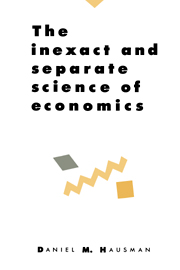Book contents
- Frontmatter
- Contents
- List of figures
- Dedication
- Introduction
- Part I Introduction, structure, and strategy
- Part II Theory assessment
- 8 Inexactness in economic theory
- 9 Methodological revolution
- 10 Karl Popper and falsificationism in economics
- 11 Imre Lakatos and economic methodology
- 12 Economics as an inexact and separate science
- 13 On dogmatism in economics: the case of preference reversals
- Part III Conclusion
- Appendix: An introduction to philosophy of science
- Bibliography
- Index
13 - On dogmatism in economics: the case of preference reversals
Published online by Cambridge University Press: 04 August 2010
- Frontmatter
- Contents
- List of figures
- Dedication
- Introduction
- Part I Introduction, structure, and strategy
- Part II Theory assessment
- 8 Inexactness in economic theory
- 9 Methodological revolution
- 10 Karl Popper and falsificationism in economics
- 11 Imre Lakatos and economic methodology
- 12 Economics as an inexact and separate science
- 13 On dogmatism in economics: the case of preference reversals
- Part III Conclusion
- Appendix: An introduction to philosophy of science
- Bibliography
- Index
Summary
What happens when economists come across disconfirming experimental evidence? In this chapter, I will discuss one fascinating case. I chose it because of its tractability and because the anomalous results have been discussed repeatedly in prominent economic journals. It is more an illustration than an argument for the interpretation of economic methodology defended above. Although it provides some evidence that economists are not committed to the inexact method a priori, one case obviously proves nothing.
The discovery of preference reversals
No economist is under any illusion that the axioms of utility theory are exceptionless universal laws, but utility theory may still be a reasonable first approximation that is useful in predicting and explaining behavior. What should be worrisome to economists would be evidence that people's choices differ systematically from those predicted by utility theory.
One way in which people's choice behavior does apparently deviate systematically from that predicted by utility theory involves so-called “preference reversals.” Paul Slovic and Sarah Lichtenstein describe the discovery of this phenomenon as follows:
The impetus for this study was our observation in our earlier 1968 article that choices among pairs of gambles appeared to be influenced primarily by probabilities of winning and losing, whereas buying and selling prices were primarily determined by the dollar amounts that could be won or lost….Subjects setting a price on an attractive gamble appeared to start with the amount to win and adjust it downward to take into account the probability of winning and losing, and the amount that could be lost. […]
- Type
- Chapter
- Information
- The Inexact and Separate Science of Economics , pp. 227 - 244Publisher: Cambridge University PressPrint publication year: 1992
- 1
- Cited by



